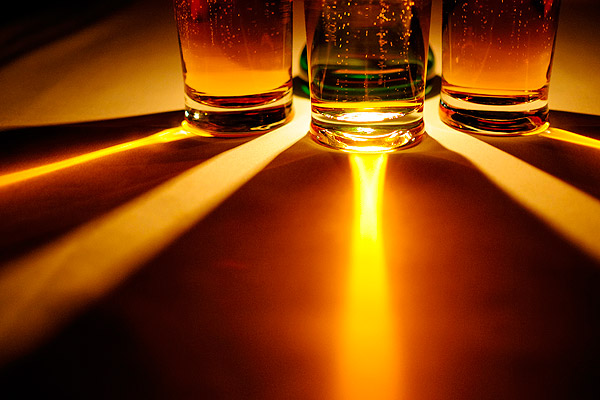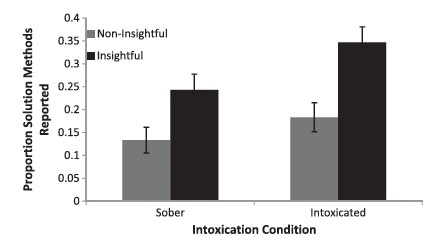
A new study out of UIC has been getting headlines: "Uncorking the muse: Alcohol intoxication facilitates creative problem solving" (PDF). On some level, it makes intuitive sense: lots of creative types are famous for their drinking (mid-century American authors, rock musicians), not many are famous for teetotaling (Ted Nugent? Ian MacKaye?). The authors set out to test the connection, and to see if it fits into other research on creativity. The mechanisms by which it happens are pretty interesting.
They got their subjects moderately liquored-up (.07 BAC, just under the legal limit), and gave them a test:
For each item, participants are given three target words such as PEACH, ARM, and TAR, and are tasked with finding a fourth word, such as PIT, that forms a good two-word phrase with each of the target words. The RAT is thought to involve creative problem solving because the most salient potential responses to the problem are often incorrect, and one must retrieve more remote associates in order to reach solution.
Then they asked them how they came to the conclusion, on a scale of revelation to determination:
One common way to test for differences in the perception of solution methods is through feeling-of-insight ratings, in which participants assess whether they felt the solution came suddenly to mind (an Aha! moment) or if they felt they reached solution through step-by-step, analytic processes.
The moderately intoxicated won in a rout: not only did they have more "insightful" answers, they had more correct ones, too.

The results fit in with both folk wisdom about drinking and scientific research on creativity. The intoxicated subjects, unsurprisingly, did worse on memory tests, and that's thought to be the key. Drinking makes you less focused and less able to reason. Or, as the authors put it, "the advantage of low WMC [working memory capacity] individuals was driven by their use of simple heuristics and less persistence in using complex, resource intensive approaches." (This is why there are lots of famous drunk artists, but no famous drunk accountants.) Rather than using a time-consuming, brain-consuming step-by-step method, being unable to stick with such a process makes people fall back on intuition and association, which actually works better.
Think of it this way: at some point, you've probably lost something, and followed a logical method of finding it—retracing your steps, retracing your usual routine—and been unable to, because you lost it somewhere seemingly illogical. Then, when you're doing something else, it occurs to you. Perhaps if you'd really reasoned through your steps, digging deep into your memory for the non-routine steps, you might have found it, but that's really hard to do.
For example: I lost my pass to the office the other day and looked everywhere for it. Well, "everywhere": my bag, my coat, my pants pockets, the basket near the door where I sometimes put it, the basket near the bed where I try to put it, the clothes hamper, behind the radiator where I put my pants instead of the hamper. Everywhere I could logically think of that I would have put it, or where it was likely to have fallen. At least twice.
Then I came home, and instantly saw it hanging from the knob to the kitchen cabinet where (I think) it had pulled off while I was cooking. Pacing around the apartment that morning, I was so focused on where it should have been that I didn't see where it actually was, even though it was hanging by a red string in the room I pass through the most. I must have walked by it five or six times, but since I had no reason to look there, I missed it.
So why does your brain work so well when you leave it alone? And what does that have to do with booze? The authors suggest a pathway:
The two hemispheres [of the brain] may be attuned to particular types of processing, with the left hemisphere specializing in using fine processing to narrow the activation in the semantic network to one predominant or a few closely related concepts, while the right hemisphere uses coarse processing to activate a broad, diffuse array of remote associates.
When I was looking for my pass, I was "using fine processing" to concentrate on "a few closely related concepts" (places I usually put the pass or it falls). If my brain had considered a "broad, diffuse array of remote associates," maybe I would have found it. Something that's hard to find in your brain is sort of like something that's hard to find in your house. Which brings us back to booze:
As attentional control decreases with intoxication, the ability to maintain attention on the closely-related associates activated by the left hemisphere may be reduced, while remote associates activated by the right hemisphere may then gain easier access to the focus of attention.
Booze isn't the only way to do this. Sleep does too, with the idea being that REM sleep is basically another way of not paying attention. Brain damage also helps ("frontal lobe patients also suggest that deficits in attentional control may positively affect creative problem solving"). Or being sleepy:
The results are a testament to the creative virtues of grogginess. When people were tested during their “least optimal time of day” — think of that night owl stumbling into the lab in the early morning — they were significantly more effective at solving insight puzzles. (On one problem, their performance increased by nearly 50 percent.) Performance on the analytic problems, meanwhile, was unaffected by the clock.
The last bit of mind wandering research worth highlighting also comes from the Schooler lab. He’s demonstrated that people who consistently engage in more mind-wandering — Schooler gives subjects a slow section of War and Peace, and then times how long it takes before they start thinking about something else — also score significantly higher on various measures of creativity.
It's related to the base concept of lowering inhibitions, but more complicated: booze, sleep, and boredom make your mind wander, almost literally. Rather than being focused on getting from one point to another through a direct, logical route, it spins off into far corners of your brain. But you do have to have enough executive function to drag it back from there, so drink responsibly. A suggestion for further research: whether Half Acre's Cipher helps you solve the cipher on the label.
Related (in a broad, diffuse way): the importance of Guinness to the scientific method.
Photograph: Kuba Bożanowski (CC by 2.0)



Comments are closed.